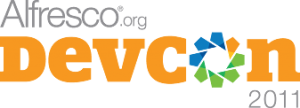I am at the Community Leadership Summit (CLS) in Portland this weekend where hundreds of people whose jobs it is to lead communities have come together to collaborate on a wide variety of community-related topics.
One of the talks I attended yesterday was “What the Hell Do We Do Everyday?” by Evan Hamilton. The goal was to compare notes on how community leaders spend their time day-to-day. As part of the discussion, I roughed out a “Bucket Model” that groups the types of tasks that seem to me to be part of the job. Many people seemed to like it so I thought I’d post it here.
Although I’ve been active in the Alfresco community for a long time, it didn’t become my full-time job until a few months ago. When that happened, the first thing I did was think about what the community needed from me. I wrote down all kinds of things, from tactical stuff like, “Answer questions in the forum” to more strategic stuff like, “Make the community more vibrant”. As I looked at my list I realized that there were buckets of things I needed to do that probably wouldn’t change much over time. Because I’m part of the Marketing organization, I also realized that my buckets should all start with the same letter. And maybe if my buckets were one word action verbs, they’d stick in the minds of my team and the community. So here are the 3 E’s of Community Leadership: Engage, Enable, and Expose.
Engage
Engage is about engaging community members, regardless of skill set or role in the community, to participate more deeply. This encompasses tasks like connecting community members with community initiatives, speaking at local community events, or facilitating a community advisory board or some other type of discussion. Engage is really about being an active and present part of the community.
Enable
Enable is a bucket of tasks around making sure the community has the tools they need to meet their goals. This is not only removing hurdles and resolving conflict, but also providing technical tools and infrastructure like wikis, forums, IRC channels, etc. If your community is technical, it could also mean providing examples, tutorials, and code snippets.
Expose
Expose consists of tasks that are about exposing the greatness already existing in the community, both community projects and individuals. The goal here is to really be the amplifier around the good things going on in the community. This helps increase community awareness, but it also helps reinforce and model the behavior that you want to encourage from the rest of the community.
The tasks in the “3 E’s” buckets are all about moving forward toward achieving the community vision. But there are also a set of “run-and-maintain” tasks that are really about keeping the wheels from falling off. Maybe this ought to be a fourth “E” bucket called “Execute“. These tasks fall into sub-buckets like:
Monitor. As community leaders, we have all sorts of channels we’re wired into: Email, Social, IRC, Forums, Wiki, Blogs, etc. Part of execution is monitoring and responding to these channels. As one of the attendees pointed out, if you aren’t careful, this one can suck the life out of you if you don’t manage it properly.
Measure. Putting measures in place and keeping track of those measures is an important way to figure out if you’re making progress against your plan. The specific measures are different for each community but they might be things like survey results, downloads, installs, registered forum/wiki users, forum points awarded, etc.
Report. Report is about getting reports from your team and reporting status to the rest of the community.
Plan. This bucket is about periodically reviewing and refining your plan.
I’ve spun up projects/initiatives that slot into each of these buckets. So, on any given day, I’m either personally working on tasks that fall into these buckets, or I’m working with team mates and other members of the community who are doing the same.
So, if you’ve ever wondered what Alfresco’s Chief Community Officer does, now you know. And if you’re also a community leader, I’d love to see how this maps up to what you do. What did I miss?

 We’ve finally got everything settled around the cities, venues, and dates for our annual
We’ve finally got everything settled around the cities, venues, and dates for our annual